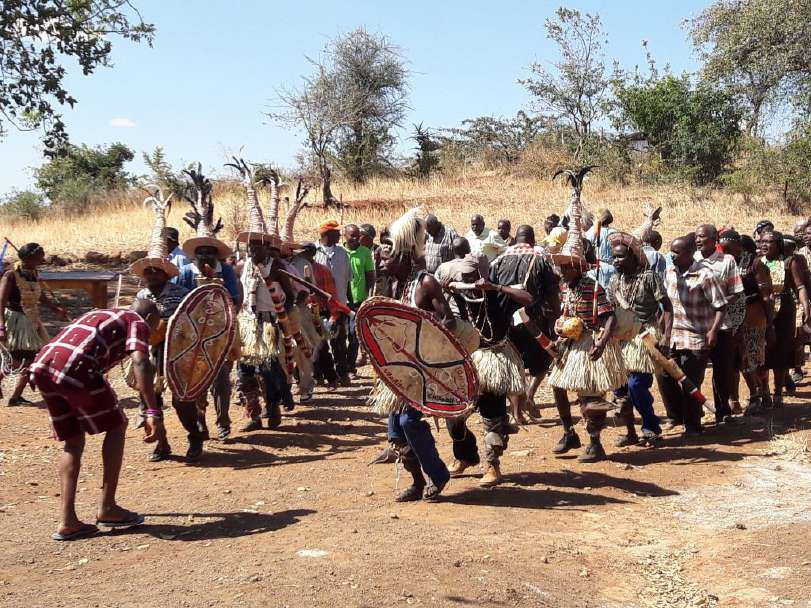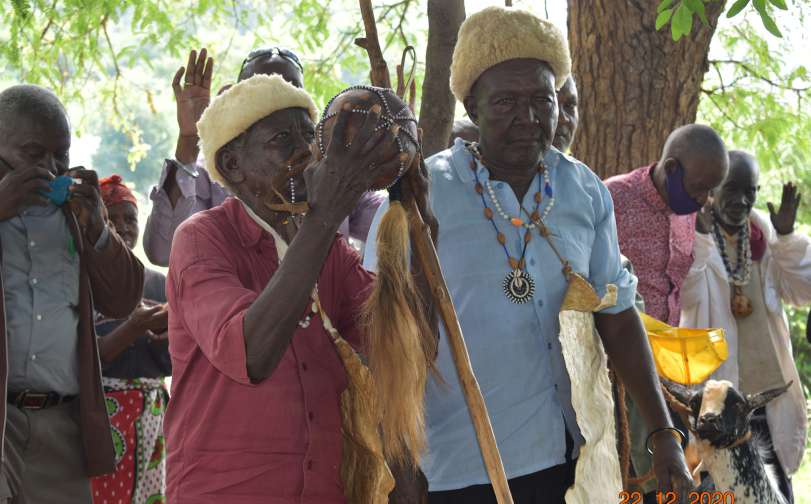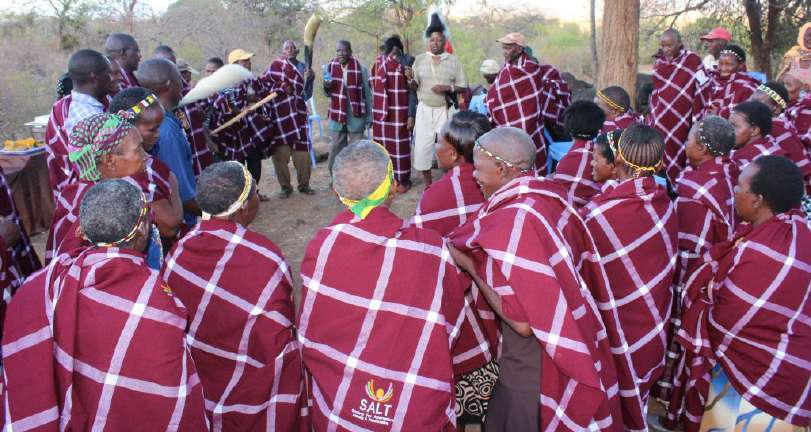Society for Alternative Learning and Transformation is a community-based network of cultural and ecological governance institutions founded and established under customary laws of the Tharaka indigenous community. These cultural and ecological institutions include clans, chiefdoms, kingdoms, councils of elders, custodians of sacred natural sites, diviners and spiritual leaders, traditional healers, and so on. SALT has been reviving cultural rituals and ceremonies to build solidarity and resilience within the community.
| Authors | Simon Mitambo |
|---|---|
| Topics | Ancestral Knowledge, Decolonization |
| Case Report | Volume 1: "Resilience in the Face of COVID-19" |
Brief description
The traditionally known as Nthiguru iri Njuki (The Land of the Bees), is located between the foothills of Mount Kenya and River Tana. This semi-arid land is a biodiversity hotspot characterised by lowland scrub and many hill-ranges. Although the Tharakans had rich cultural traditions—the community’s elders with deep ecological knowledge used to be at the centre of their governance systems—these traditions have been increasingly undermined. This has been so because of the promotion of ill-conceived projects within the region by the government and external agencies, including livelihood projects promoting livestock and seeds that are not adapted to these conditions. The traditional governance system has been eroded as have customary laws that controlled the cutting of trees, hunting of animals, and farming too close to water sources. This has all contributed to the community being increasingly vulnerable to pandemics and climate disruptions.
Process that led to the community being resilient (Pre-covid)
The tide has been turning with the birth of the Society for Alternative Learning and Transformation (SALT) in 2013. SALT is a community-based network of cultural and ecological governance institutions founded and established under customary laws of the Tharaka indigenous community. These cultural and ecological institutions include clans, chiefdoms, kingdoms, councils of elders, custodians of sacred natural sites, diviners and spiritual leaders, traditional healers, and so on. SALT has been reviving cultural rituals and ceremonies to build solidarity and resilience within the community. Over time, customary laws that control the cutting of trees, hunting of animals, and farming too close to water sources have started being respected and followed once again. The role of Sacred Natural Sites (SNS)—which are rich bio-cultural areas with spiritual significance—is slowly being revived and now, these sites are becoming central to culture, food sovereignty, and protection of ecosystems.
The community’s elders remember how they have survived pandemics and plagues similar in nature to COVID-19. They have their own traditional ways of responding to these events that have helped them to be resilient in the face of many similar challenges. These traditional responses are part of the reason that the Tharakan people are still here—despite huge locust swarms that have threatened food crops in the region and diseases like smallpox that have threatened the community before.
One of the responses to these threats is a ritual called Muriira. It is a rare ritual which is done only when the community is threatened by illness or pestilence. Muriira comes from the Tharakan word kuriira, which means to prevent, to stop, to cast away.
Traditionally, the Tharakan elders conducted Muriira when they learnt about threats originating in neighbouring areas that could pass into Tharakan territory. The elders would gather people together and raise awareness of the threat, where it was coming from, and why they were concerned, thereby sharing key information and reducing the chances of being affected by it.
How resilience that was established has helped during the pandemic
When the COVID-19 pandemic surged through Kenya, the elders gathered the community together to conduct the Muriira ritual. For the first time, this brought together the Christians and Traditionalists in the performance of this ritual. Their coming together in solidarity gave the community a relief from the shock created by the pandemic.
Muriira requires people to provide and prepare sacred seeds—millet, sorghum and finger millet—and to source wild herbs for the elders to use. These need to be prepared in specific ways over the eight days of the ritual by community members under the guidance of the elders. Women and men prepare large batches of gruel from the seeds and local honey. Specific plants are used to make marigi, which are small models that are made to look like closed doors.
Once all the ingredients for the ritual are prepared, led by the elders, the people go chanting and praying to different homesteads throughout the territory, blessing them using the seed and honey gruel. The processions and the ritual have four key focal points: North, East, South, and West. These cardinal points are very important in Tharakan cosmology. Elders chosen by the community split up to visit the roads or paths leading to the Tharakan territory which also overlap with these four cardinal directions. They then dig a hole and bury the marigi (the closed door model) in, or, by the road before saying prayers and returning to the heart of the community.
The ritual has helped create harmony between elements of the community that have been in conflict in recent years. For example, some Christian community members are often hostile to the elders who continue to practice traditional spirituality. But, during the pandemic, their eyes have been opened to the value of Muriira and the traditional ways of doing things. Some have even donated seeds and herbs to the ritual.
When the elders are asked about why the Christians were compelled to contribute, they say it is because before they are Christians, these people are Africans. They are Africans first. During this pandemic, their minds appear to be opening to the ways of their forefathers. Once again, they seem to be seeing the value in rituals and what they can do for the community. This ritual brings people together—both physically and culturally—to attend to each other’s wellbeing and the health of the territory as well as to defend it from threats. It helps people remember who they are as Tharakans and their responsibilities to their homeland. They become spaces to listen to the community’s knowledgeable elders. The return of Muriira and the community’s active engagement with it, even from afar, is a sign of something bigger. It is a sign that the community is turning the tide on the history of loss in their land.
The community has also been working to bring back local varieties of resilient seeds. Over the past five to six years, there has been a huge increase in seed diversity, community seed swaps, as well as the knowledge of how to grow, cook, save, and store the seeds. These seeds are well-suited to the land. They grow well in the local conditions and are resilient to changing climatic patterns and ever-increasing climatic disruptions. The people who have revived these seeds are getting good harvests and eating healthy. Such localised and healthy food is very useful in building bodily immunity against diseases and pandemics. The revival of traditional seeds and practices has also made the community less dependent on the outside market for their basic sustenance needs.
Through the work with SALT, the community has continued documenting customary laws for legal recognition and protection of bio-cultural diversity. The community also plans to establish a community botanical garden, while strengthening the already existing garden at the local school. SALT remains committed and strategically connected to national, regional, and global processes to ensure that its work with communities can contribute and influence all levels of political decision-making.
Lessons learnt
If we want to survive on this planet, we have to take care of our own biodiversity. COVID-19 is a wake-up call about how we should live in harmony with nature as the Tharakans once did—and are learning to do so once again. They are showing us the importance of traditional knowledge systems as a counterweight to the hegemonic paradigm of modernity. Seed diversity is being promoted and sustainable ecological farming practices are also being adopted. The community members are learning to become the custodians of their ecosystem—which also helps them cope with challenges using non-destructive methods.
The lesson is that we cannot go back to business as usual after this pandemic. Let us not start thinking about how we are going to allow polluting industries to run again. Instead, let us ask ourselves and one another, as if we are gathered in the heart of the village: Do we really want to restore industries that have polluted our air so badly that we cannot see Mount Kenya through the fog? How might we do better?


